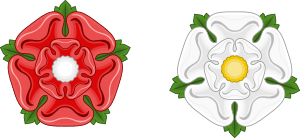Stafford and Lovell rebellion facts for kids
Quick facts for kids Stafford and Lovell rebellion |
|||||||
|---|---|---|---|---|---|---|---|
| Part of the Wars of the Roses | |||||||
 |
|||||||
|
|||||||
| Belligerents | |||||||
| Commanders and leaders | |||||||
The Stafford and Lovell rebellion was the very first armed challenge to King Henry VII. This happened after he became king in 1485, following his victory at the Battle of Bosworth. The rebellion was led by Francis Lovell, Viscount Lovell, and two brothers, Sir Humphrey Stafford and Thomas Stafford. They were from Grafton in Worcestershire, England. The uprising took place around Easter in 1486.
Contents
Starting the Rebellion
After King Henry VII won the Battle of Bosworth in 1485, Francis Lord Lovell and Humphrey Stafford sought sanctuary at Colchester Abbey. Sanctuary was a special protection offered by churches. It meant that people who went there could not be arrested. These plotters wanted to bring back the Yorkist royal family.
King Henry VII used spies to watch people who supported the Yorkists. In April 1486, the King found out that Lovell and Humphrey Stafford had escaped. They were planning a rebellion. King Henry sent Sir Richard Edgcumbe and Sir William Tyler to capture Lovell.
Lovell's plan failed, and he joined other rebels. Later, he escaped to Margaret of York in Flanders. Meanwhile, the Stafford brothers started their rebellion in Worcester. This was despite King Henry having a lot of support in that area.
King Henry's Response
At this time, King Henry was in York on a tour of the country. As soon as he heard about the rebellion, he moved towards Worcester. He wanted to stop the Yorkist supporters. On May 11, 1486, the Stafford brothers ran away again. They found sanctuary at Culham in a church belonging to Abingdon Abbey.
Ending the Rebellion
King Henry had the Stafford brothers taken from the abbey on the night of May 14. About 60 armed men, led by Sir John Savage, removed them. Sir John Savage had led the left side of Henry's army at the Battle of Bosworth.
The abbot of the abbey was very upset. He complained that the King had broken the abbey's old rights of sanctuary. However, the two brothers were put on trial. The judges decided that sanctuary did not apply in cases of treason. Treason means going against the king or country.
Henry then ordered that Sir Humphrey Stafford be executed. But he forgave the younger brother, Thomas Stafford.
Aftermath and Future Challenges
The arrest of the Staffords caused protests against Pope Innocent VIII. These protests were about breaking the right of sanctuary. In August, the Pope agreed to make some changes to the rules about sanctuary.
Sir John Conyers was thought to be involved in the rebellion. He lost his job as steward of Middleham. He also had to pay a large bond of £2,000. The Abbot of Abingdon, who gave sanctuary to the Staffords, also had to pay a bond of 3000 marks. This was a promise of loyalty.
King Henry did not want to upset Viscount Lovell and his family too much. On July 5, 1486, Lovell was given a new job as a justice.
However, Lovell would later return to England. He fought against the King again. He took part in what is seen as the final battle of the Wars of the Roses. This was the Battle of Stoke Field on June 16, 1487. Sir John Savage was also there, leading King Henry's cavalry.
The Battle of Stoke Field was a big win for Henry. Almost all the main Yorkist leaders were killed. After this, no more battles were fought between Yorkist and Lancastrian forces. Lovell survived the defeat but disappeared soon after. He was never seen again.
 | Madam C. J. Walker |
 | Janet Emerson Bashen |
 | Annie Turnbo Malone |
 | Maggie L. Walker |

